The Vice-O-Meter: Dr. Oz Helps You Kick Your Worst Habits
Just how bad is it to eat a whole bag of chips in one sitting? Or sip more than one glass of wine a day? Here, a ranking of the things we do when we think no one's looking and how to stop.
By Dr. Mehmet Oz

Photo: Thinkstock
Nail Biting
Vice-O-Meter: 2.5
The Harm:
This pervasive habit is sometimes a sign of an underlying mental health condition, such as anxiety or an impulse control disorder. It isn't likely to cause long-term damage or interfere with fingernail growth as long as the nail bed remains intact, but it can lead to infection. As you chew on your fingertips, bacteria or possibly even pinworm eggs under the surface of the nails can enter your mouth. When you have a sore on your lips or in your mouth, it's even easier for germs to get in.
The Cure:
If I didn't get you with "pinworm," go to your pharmacy and pick up one of the bitter-tasting clear polishes designed to discourage nail biters from biting. Research shows they really can work.
The Harm:
This pervasive habit is sometimes a sign of an underlying mental health condition, such as anxiety or an impulse control disorder. It isn't likely to cause long-term damage or interfere with fingernail growth as long as the nail bed remains intact, but it can lead to infection. As you chew on your fingertips, bacteria or possibly even pinworm eggs under the surface of the nails can enter your mouth. When you have a sore on your lips or in your mouth, it's even easier for germs to get in.
The Cure:
If I didn't get you with "pinworm," go to your pharmacy and pick up one of the bitter-tasting clear polishes designed to discourage nail biters from biting. Research shows they really can work.

Photo: Thinkstock
Wearing Contacts for Too Long
Vice-O-Meter: 3
The Harm:
A 2011 study found that as many as 67 percent of contact wearers use their lenses for longer than the manufacturer recommends. But remembering to switch to a new pair is worth the effort: About one-quarter of the "noncompliant" study subjects reported symptoms ranging from conjunctivitis to corneal abrasion. Even with regular cleaning, contacts may become coated with proteins, lipids, and environmental irritants, all of which can lead to a variety of complications.
The Cure:
Go to acuvue.com and sign up for Acuminder, a free service that sends you an automatic reminder via e-mail or text when it's time to open a new pack.
The Harm:
A 2011 study found that as many as 67 percent of contact wearers use their lenses for longer than the manufacturer recommends. But remembering to switch to a new pair is worth the effort: About one-quarter of the "noncompliant" study subjects reported symptoms ranging from conjunctivitis to corneal abrasion. Even with regular cleaning, contacts may become coated with proteins, lipids, and environmental irritants, all of which can lead to a variety of complications.
The Cure:
Go to acuvue.com and sign up for Acuminder, a free service that sends you an automatic reminder via e-mail or text when it's time to open a new pack.

Photo: Thinkstock
Rubbing Your Eyes
Vice-O-Meter: 3.5
The Harm:
While you probably don't even realize you're doing it, rubbing your closed lids can cause a spike in the fluid pressure inside your eyes, up to ten times the normal amount. Over the years—especially for those with dry, itchy eyes—frequent, mindless rubbing may contribute to the development of problems associated with intraocular pressure, including shortsightedness and glaucoma (which can lead to blindness).
The Cure:
Try wearing mascara and a darker shadow: The risk of looking like Alice Cooper will discourage you from touching your lids when you're feeling sleepy. If you suffer from dry, irritated eyes, seek treatment for the itchiness.
The Harm:
While you probably don't even realize you're doing it, rubbing your closed lids can cause a spike in the fluid pressure inside your eyes, up to ten times the normal amount. Over the years—especially for those with dry, itchy eyes—frequent, mindless rubbing may contribute to the development of problems associated with intraocular pressure, including shortsightedness and glaucoma (which can lead to blindness).
The Cure:
Try wearing mascara and a darker shadow: The risk of looking like Alice Cooper will discourage you from touching your lids when you're feeling sleepy. If you suffer from dry, irritated eyes, seek treatment for the itchiness.
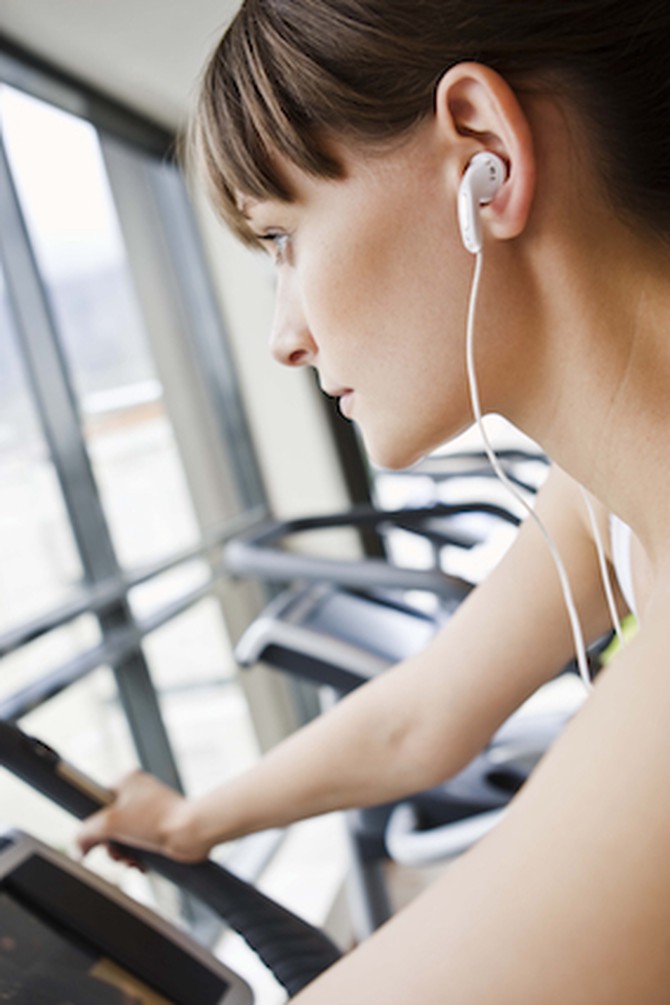
Photo: Thinkstock
Listening to Loud Music
Vice-O-Meter: 4
The Harm:
One tune-fueled cardio session could be enough to damage your ears. Researchers at Ghent University in Belgium found that after 60 minutes of listening to pop-rock on earbuds or headphones (at 50 to 100 percent of an iPod's maximum volume), subjects suffered significant short-term hearing deterioration. Over time, repeated exposure to loud music can lead to permanent damage. These days hearing loss is becoming more and more common in young people.
The Cure:
Turn down the volume. If you exercise in a noisy setting, try sound-isolating headphones. They block ambient noise, so you can hear your music at a lower volume.
The Harm:
One tune-fueled cardio session could be enough to damage your ears. Researchers at Ghent University in Belgium found that after 60 minutes of listening to pop-rock on earbuds or headphones (at 50 to 100 percent of an iPod's maximum volume), subjects suffered significant short-term hearing deterioration. Over time, repeated exposure to loud music can lead to permanent damage. These days hearing loss is becoming more and more common in young people.
The Cure:
Turn down the volume. If you exercise in a noisy setting, try sound-isolating headphones. They block ambient noise, so you can hear your music at a lower volume.
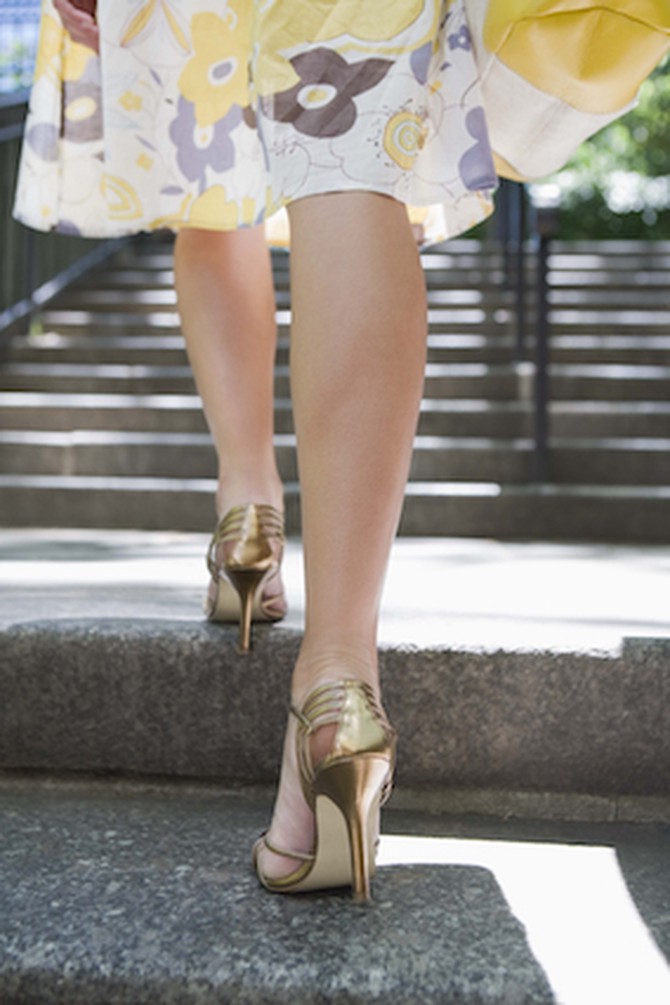
Photo: Thinkstock
Walking in Heels Every Day
Vice-O-Meter: 5
The Harm:
Heels can hurt more than just your feet. One study showed that teetering around in towering shoes disrupts blood flow in the legs, potentially causing venous hypertension and varicose veins. High heels can even alter the neuromechanics of your gait, due to the strain they put on leg muscles and tendons.
The Cure:
Go shorter, with low-wedged heels, as often as you can; they distribute your weight better and take pressure off the balls of your feet. If you're not ready to give up stilettos, at least change into more supportive shoes when you're walking farther than the printer, and at the end of the day, massage your feet to relieve tension in the tissues.
The Harm:
Heels can hurt more than just your feet. One study showed that teetering around in towering shoes disrupts blood flow in the legs, potentially causing venous hypertension and varicose veins. High heels can even alter the neuromechanics of your gait, due to the strain they put on leg muscles and tendons.
The Cure:
Go shorter, with low-wedged heels, as often as you can; they distribute your weight better and take pressure off the balls of your feet. If you're not ready to give up stilettos, at least change into more supportive shoes when you're walking farther than the printer, and at the end of the day, massage your feet to relieve tension in the tissues.
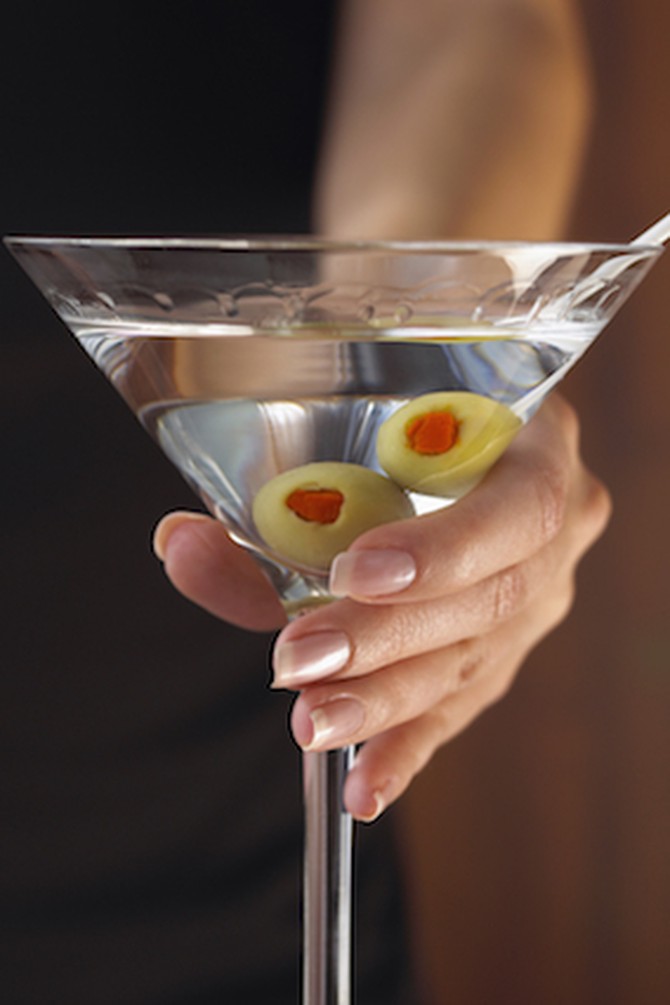
Photo: Thinkstock
Consuming More than One Drink a Day
Vice-O-Meter: 6
The Harm:
It's true that a daily dose of booze can do a body good. But alcohol, of course, is a poison as well as a tonic, and after one serving (12 ounces of beer, 5 ounces of wine, or 1.5 ounces of hard liquor), the cons can start to outweigh the pros. Drinking is linked to a number of cancers, as well as heart and liver damage.
The Cure:
Sip on your second- or third-choice beverage rather than your absolute favorite. This will make it easier to cut yourself off after one. If you're drinking wine, use a glass meant for white—they're usually smaller and can help you avoid overpouring.
The Harm:
It's true that a daily dose of booze can do a body good. But alcohol, of course, is a poison as well as a tonic, and after one serving (12 ounces of beer, 5 ounces of wine, or 1.5 ounces of hard liquor), the cons can start to outweigh the pros. Drinking is linked to a number of cancers, as well as heart and liver damage.
The Cure:
Sip on your second- or third-choice beverage rather than your absolute favorite. This will make it easier to cut yourself off after one. If you're drinking wine, use a glass meant for white—they're usually smaller and can help you avoid overpouring.
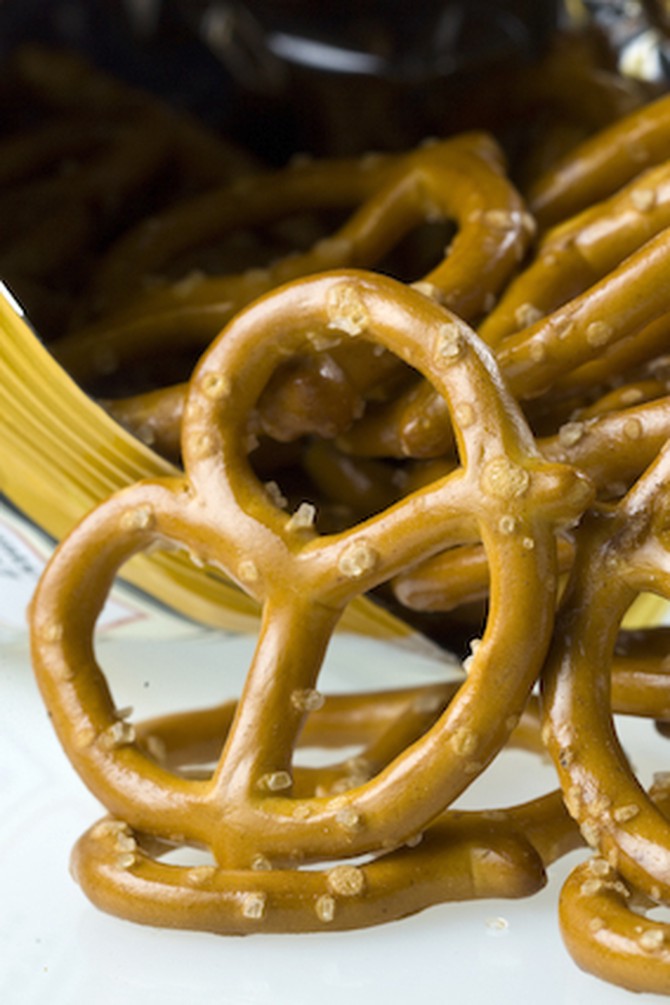
Photo: Thinkstock
Snacking Straight from the Package
Vice-O-Meter: 6.5
The Harm:
You tear open a bag of pretzels—and before you know it, they're gone. Sound familiar? When we eat from a bag, box, or tub, we keep eating because...there's more to eat. A study published in the journal Obesity found that when a portion of food doubles in size, people eat approximately 80 percent more.
The Cure:
Shop for single-serving packs of everything from popcorn to olives to hummus. A University of Colorado study reported that when people snacked from 100-calorie packs rather than regular-size containers, they consumed about 120 fewer calories per day.
The Harm:
You tear open a bag of pretzels—and before you know it, they're gone. Sound familiar? When we eat from a bag, box, or tub, we keep eating because...there's more to eat. A study published in the journal Obesity found that when a portion of food doubles in size, people eat approximately 80 percent more.
The Cure:
Shop for single-serving packs of everything from popcorn to olives to hummus. A University of Colorado study reported that when people snacked from 100-calorie packs rather than regular-size containers, they consumed about 120 fewer calories per day.

Photo: Thinkstock
Speed Eating
Vice-O-Meter: 7
The Harm:
Wolfing down your food might save you some time today, but it can have serious consequences tomorrow. Multiple studies have linked eating too quickly with being overweight. The likely cause: It takes the brain about 20 minutes to register that the stomach is full, so by the time a speed eater feels satiated, she's already eaten too much.
The Cure:
Slow the pace of your meal by chewing more before your swallow. Bonus: You may get more nutrients, and you might even feel fuller longer. In an American Journal of Clinical Nutrition study, subjects who chewed almonds 40 times were less hungry two hours later than those who chewed the nuts 25 times.
The Harm:
Wolfing down your food might save you some time today, but it can have serious consequences tomorrow. Multiple studies have linked eating too quickly with being overweight. The likely cause: It takes the brain about 20 minutes to register that the stomach is full, so by the time a speed eater feels satiated, she's already eaten too much.
The Cure:
Slow the pace of your meal by chewing more before your swallow. Bonus: You may get more nutrients, and you might even feel fuller longer. In an American Journal of Clinical Nutrition study, subjects who chewed almonds 40 times were less hungry two hours later than those who chewed the nuts 25 times.
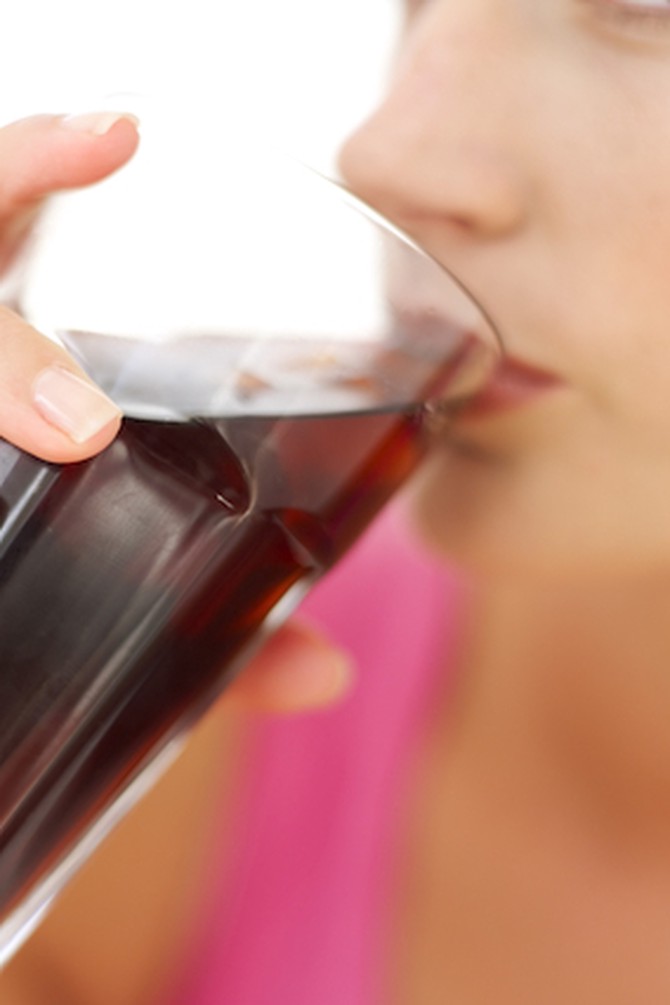
Photo: Thinkstock
Drinking Diet Soda Every Day
Vice-O-Meter: 8
The Harm:
The good news is that artificial sweeteners (like aspartame and sucralose) found in "diet" or "light" soft drinks won't give you cancer. But large-scale studies indicate that they can lead to weight gain. Increasing evidence suggests that fake sugars activate the brain's reward pathways differently than natural sugars do. As a result, you don't feel as satisfied—and your appetite actually increases.
The Cure:
Switch to juice—or better yet, develop a water habit. If you must drink soda, have a regular and dilute it with seltzer.
The Harm:
The good news is that artificial sweeteners (like aspartame and sucralose) found in "diet" or "light" soft drinks won't give you cancer. But large-scale studies indicate that they can lead to weight gain. Increasing evidence suggests that fake sugars activate the brain's reward pathways differently than natural sugars do. As a result, you don't feel as satisfied—and your appetite actually increases.
The Cure:
Switch to juice—or better yet, develop a water habit. If you must drink soda, have a regular and dilute it with seltzer.
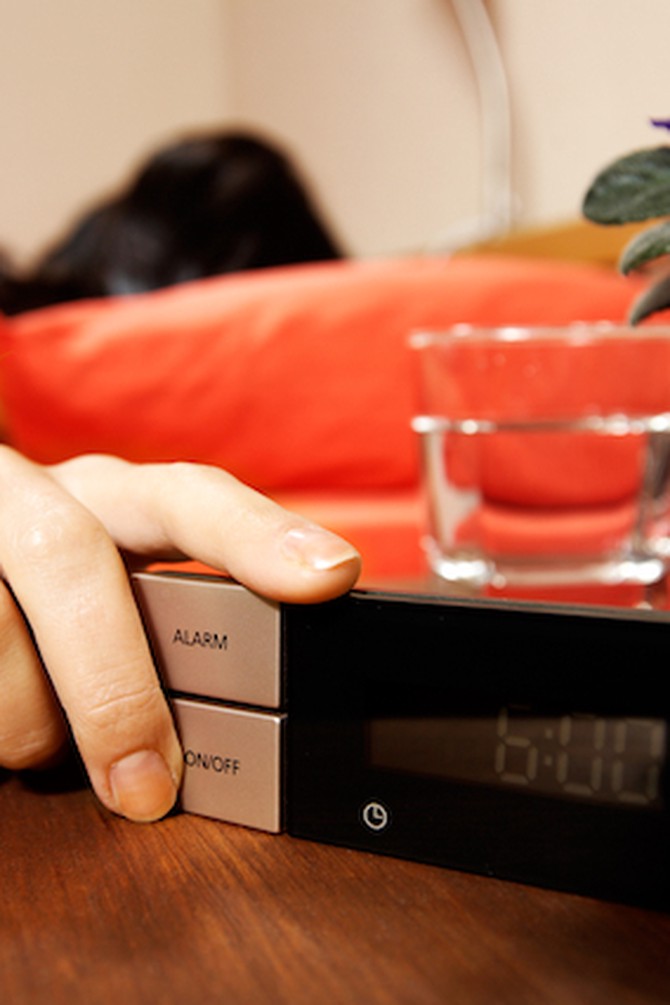
Photo: Thinkstock
Not Getting Enough Sleep
Vice-O-Meter: 9
The Harm:
Numerous studies show that sleep deprivation causes elevated levels of ghrelin, the hunger hormone, which can lead you to overeat. But it's not just your waistline you need to worry about. A study published this spring found that regularly getting less than six hours of sleep can double a person's risk for heart attack and stroke.
The Cure:
Establish a relaxing pre-bedtime routine that doesn't involve a computer or TV. The blue-hued light from their screens has been shown to throw off the body's natural circadian rhythm, keeping you alert into the night.
The Harm:
Numerous studies show that sleep deprivation causes elevated levels of ghrelin, the hunger hormone, which can lead you to overeat. But it's not just your waistline you need to worry about. A study published this spring found that regularly getting less than six hours of sleep can double a person's risk for heart attack and stroke.
The Cure:
Establish a relaxing pre-bedtime routine that doesn't involve a computer or TV. The blue-hued light from their screens has been shown to throw off the body's natural circadian rhythm, keeping you alert into the night.
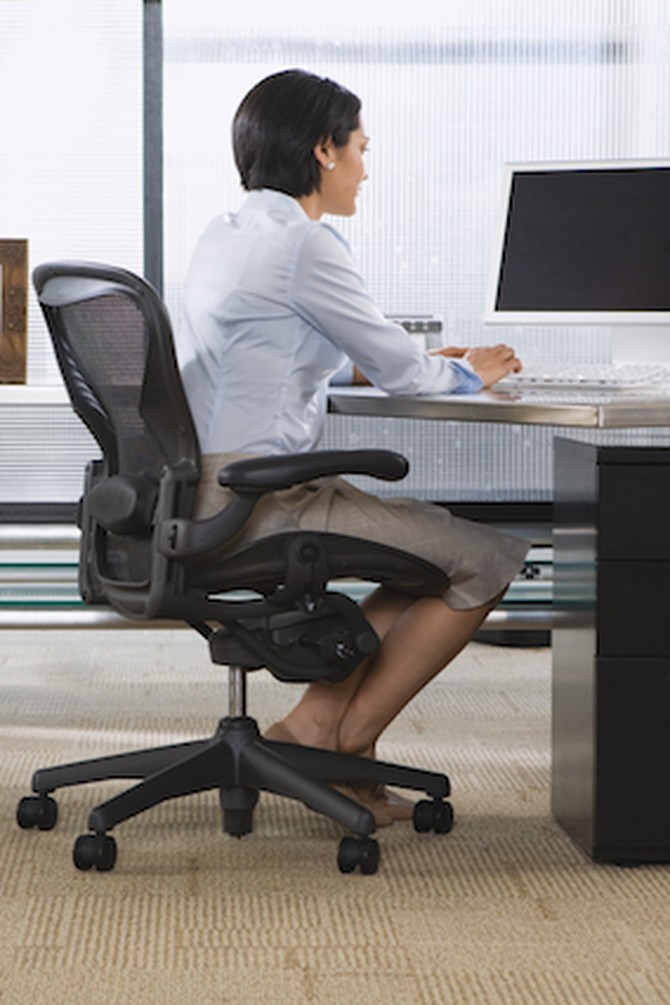
Photo: Thinkstock
Constant Sitting
Vice-O-Meter: 10
The Harm:
Women who are seated six hours or more a day have a 37 percent higher death rate than those who sit less than three hours a day. A sedentary lifestyle increases your risk of type 2 diabetes, cancer, and pulmonary embolisms (blood clots that travel to the lungs). It can even increase the size of your fat cells.
The Cure:
Embrace NEAT, or non-exercise activity thermogenesis. In English, it means any kind of movement, no matter how small. Simply standing up or walking around for a total of two hours a day can reduce your risk of diabetes by 12 percent.
The Harm:
Women who are seated six hours or more a day have a 37 percent higher death rate than those who sit less than three hours a day. A sedentary lifestyle increases your risk of type 2 diabetes, cancer, and pulmonary embolisms (blood clots that travel to the lungs). It can even increase the size of your fat cells.
The Cure:
Embrace NEAT, or non-exercise activity thermogenesis. In English, it means any kind of movement, no matter how small. Simply standing up or walking around for a total of two hours a day can reduce your risk of diabetes by 12 percent.
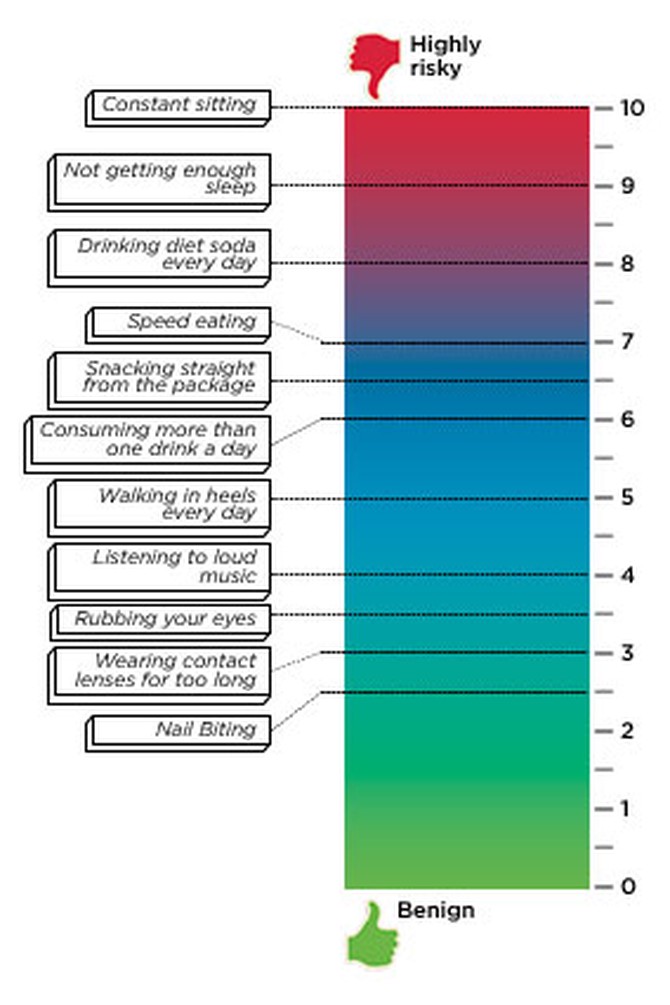
Regret It or Don't Sweat It
A few common less-than-healthy impulses, on a scale from 0 to 10.
Next: 3 ways to make up for your past health mistakes
Next: 3 ways to make up for your past health mistakes
From the August 2012 issue of O, The Oprah Magazine
As a reminder, always consult your doctor for medical advice and treatment before starting any program.

